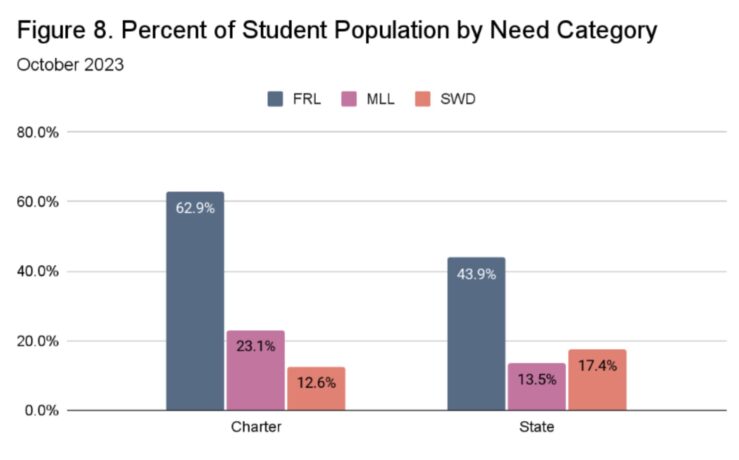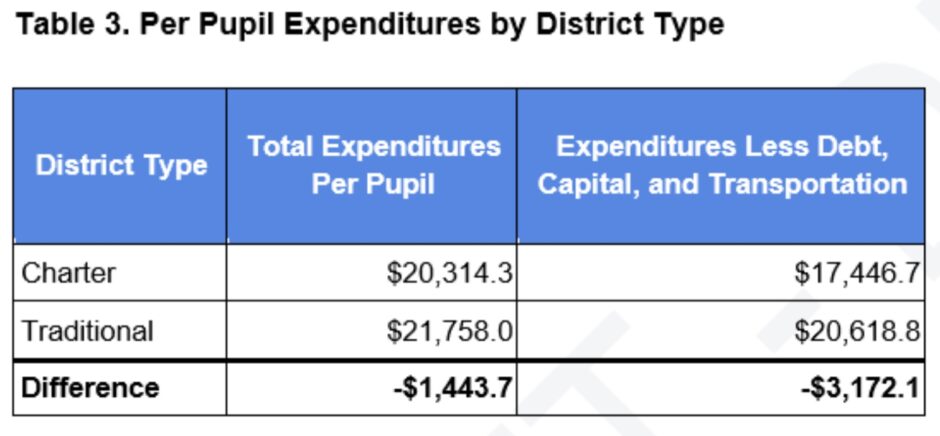Key Findings in Analysis of School Funding Formula
The Rhode Island League of Charter Schools released a comprehensive analysis of the state’s education funding formula today. The analysis found disparities in funding across districts, including:
- Students attending charter schools received less per pupil funding ($1,385 less) than students attending traditional districts, and less per pupil funding ($2,873 less) than students attending the three major sending districts (Central Falls, Pawtucket, and Providence).
- Students in both charter and traditional districts with large populations of multilingual learners and students with disabilities do not receive additional funding within the formula to provide the educational support needed for these students.
- Municipalities are responsible for important operating costs in traditional districts, such as transportation and facilities, which results in additional funding disparities for charter schools not captured in reported spending.

“Over sixty percent of students attending charter schools live in economically disadvantaged households and more than 20 percent are multilingual learners, both of which we know require more supports and financial resources, yet the state’s funding formula is short changing schools,” said Chiara Deltito-Sharrott, Executive Director of the Rhode Island League of Charter Schools. “This is an equity issue for all school districts, regardless of the type of school, that needs to be remedied if we hope to improve the education of students across the state.”
Based upon its research, the League recommends, that policy makers implement:
- Expanding the student success factor to include funding for the full range of student needs in the state. The factor should take into account the municipalities’ ability to fund education and instead provide support for concentrated poverty through an additional student success weight.
- Provide charter districts with additional support for facilities through need-based housing aid reimbursements and/or place the state in the traditional role of municipalities for charters by providing state owned facilities for use.

The League also recommends consideration of the following:
- Incorporate a state share ratio calculation for charter districts that recognizes a districts’ inability to generate revenue due to their disconnect from municipal support. Modernize the calculation of municipal ability to fund education to include statutory changes in levy limitations and revaluation schedules to more accurately target state education aid to districts who need it most.
- Improving data collection for free and reduced-price lunch for households making less than 185 percent of the federal poverty income by implementing additional data measures that address communities with populations that may be excluded from federal welfare programs. Ultimately the measure would accurately reflect poverty levels in communities.
- Provide additional state funding for charter districts to fill the gap left by local tuition holdbacks.
- Modernize the foundation amount to include all costs associated with educating students including facilities and transportation, and add additional formula weights aligned to students with additional learning needs.
- Modernize the core instruction amount to include the full cost of educating students based on an amount that considers the impact of chronic underinvestment in education on average regional expenditures per pupil.
- Provide charter schools with additional support for facilities through need-based housing aid reimbursements and/or place the state in the traditional role of municipalities for charters by providing unoccupied or underutilized state-owned facilities for use.
The report also includes information on the history of the funding formula and charter schools, explanation of the components of the formula, and perspectives from charter leaders. Charter schools are serving 12,871 students in the 2023-24 school year, 76% of which reside in historically underserved communities (Providence, Pawtucket, Central Falls).
“A predictable, equitable funding formula is critical to providing a high-quality education for all students,” said Christopher Haskins, Chair of the Board of the League and Head of School at the Paul Cuffee School. “As it currently stands, predicting state support can be difficult, especially when changes are made by the legislature after current year school budgets are already finalized. On top of this, funding for the fastest growing population, multi-lingual learners, is inconsistent and the process for calculating free and reduced-price lunch are missing students and short-changing schools.”
The League of Charter Schools commissioned an independent analysis of Rhode Island’s education funding formula by the School and State Finance Project, a nonpartisan, nonprofit policy organization that works collaboratively with policymakers, communities, and other key stakeholders to develop data-driven solutions that ensure all public-school students receive equitable education funding. They have extensive experience working with organizations throughout New England.
The Rhode Island League of Charter Schools represents 20 charter public schools that serve over 6,400 students from 34 school districts. Charter schools are public, free and open to all, funded by the public and held accountable to the public. They enroll students through a fair and transparent lottery system, which is open to all students, including many from low income, diverse communities.
For the full report, please click here.